My Cousin Richard, Storyteller
The stories he tells us remind us that we are together, that we live in a wild and beautiful place with appropriate expertise, that we are family, and native to this place.
Our family is having a conversation in stories. We’re sitting out on the balcony of my Uncle Ron’s house overlooking Alta Lake just up from the confluence of the Methow and the Columbia Rivers. The evening is all dusky with a half moon and a Mars beam, the smell of sagebrush, cottonwood and lake water. We’re getting reacquainted by the stories we tell. My cousin Richard and I are only a year apart, and we were once as close as brother and sister—still are, actually.

To describe Richard is to put him in the context of and in contrast to our fathers and uncles. There were five of them and two aunts on the Brown side of the family. The five brothers all hovered just under the six-foot range, give or take a couple inches; broad-shouldered, slim-hipped, Norwegian wedge of a nose, brown or blond-haired, mostly blue-eyed, although I don’t have an exact inventory of that detail. Bob married Mel, and Richard claims he got his dark-eyed, Spanish good looks from somebody on her side. I’ve always thought he looked like Adam Beach, the actor who plays Navaho police officer Jim Chee in the PBS movies based on Tony Hillerman’s novels. Richard got musicality, too. When we were teens, he played the guitar and sang, and he still does.
Richard radiates self-confidence. He worked as a manager and trainer for Potlatch Paper, having spent most of his working life in a mill, moving up through the ranks in accordance with his personability. He says he got pretty good at conflict resolution, and I believe him. I’d say more about his marriages and his kids, but the way things turned out, I don’t know much of anything about that part of his life.
What I know is how as kids out camping at this same Alta Lake, we’d sleep next to the tent door, so we could get up when the campground still slept in pre-dawn shadows. We’d run down through the pines and slip into the silk-cool lake. We’d swim out to the chained logs demarking the swim area and straddle them, falling off, climbing on, talking sort of quietly in deference to the sleeping campground, waiting for the sun and the long, perfect day that would follow.
When our families would visit each other on either side of the hump (the Cascade Mountains), Richard and I were a unit, throwing clay bombs off a dry cliff on our side of the mountains, building a raft and exploring the rain forest swamp on his. Growing up and growing apart from my cousins, especially Richard, was the part of adulthood I didn’t like. Our lives grew apart, but not our hearts.
Now Ron and Bob and Duane all lived on the east side in the Pateros/Bridgeport area, and sibs Richard and Marsha have landed here, too. For a few years, we started getting together out here over the Fourth of July weekend. And, as I said, my family talks in stories.

Richard used to be a compulsive monologist. He claims his wife Judy has broken him of the habit, but there was a time when one story just chained into the next. Occasionally someone will pop a matching story into the conversation, but this particular evening I’m remembering was mostly Richard’s stories. His topics are: work, hunting, fishing and boating. His genres were something like:
“I’ve done a lot of dumb things as a kid…”;
“I’ve seen men do a lot of stupid things…”;
rescue stories, mostly comic;
dog vs. wild animal stories;
stories about his Mom’s cooking.
None of the men very often tells an off-color story in front of the kids or the women, although it’s not for lack of having any.
Richard’s stories run about three to five minutes long. He usually begins with a location:
“Down in Asotin where your dad used to hunt…”
“They ended up at that empty campground at Mar-Don, that place where you and Lisle were electrocuted…”
“Down on the Oregon side of the Columbia…”
“You know how the Quincy Potholes…”
“Out of Bamfield before the inlet opens up into Barkley Sound…”
He adds characters—he always seems to remember exactly who was there:
“There was this really nice Cambodian fellow from work who was trying to catch catfish…”
“Me and Ron and Bill, Pam and Marsha and Ken…”
“We were all in the tent, me, Pam, Lisle, the three kids…”
He adds details of technology, inevitably:
“You know how a rifle is sighted two inches above the barrel…”
“Larry was tying a jig rig with a white squid…”
“Earl grabbed a dry, forked stick to hold the snake’s head down…”
Then the rising action:
“We shut off the motorbikes and all we could hear was the buzz of a rattlesnake under Earl’s back tire…”
“A rattlesnake was crawling up my oar…”
“Three swells so big you could see the green at the top where the waves were peeling off the bow…”
“The mosquitoes were so big they could screw a turkey standing up…”
The climax of the action:
“We cut the snake’s head off with a pocketknife…”
“The bicycle fell through the ice…”
“They ran the boat into the tree…”
Punchline:
“I told them I’d be back in three-four hours to tow them in…”
“I held up the rig and said, ‘Does this look familiar?’”
“I took one look and said, ‘485 6500.’ ‘What’s that?’ the lucky bastard asked me. ‘That’s my phone number. You’re going to need me as a reference when you tell this story back home because nobody is going to believe you.’”
Richard often likes to give the listener an added educational bonus like:
“You know, once you open up a rattlesnake skin and tack it out, a little inch and a half buzzer can look pretty darn good. The skin comes off real easy and it tans like a ready-to-wear belt.”
“It wasn’t my fault they were dumb enough to run into a tree, and I saw no reason to ruin a full day of fishing because of their stupidity. If they were still there when I got back, I’d be happy to tow them in.”
“A vet will anesthesize the dog and that will make the muscles relax so the quills will come out easy. But you can use a pair of pliers…”
“That’s beautiful country up there…”
Peter says my cousin Rich is like a doppelganger of me, and it’s true, we were both raised inside the family tradition of storytelling. My dad and uncles always told stories as their form of conversation. Rich has just made an art form out of the oral story, and I try to write everything down. On this occasion, I felt like we hadn’t seen each other in so long that he was giving me gift after gift after gift of one story after another, re-weaving the loosened strands of shared history, drawing them tight again, reaffirming our mutual places in the Brown Family Story--he the oral storyteller, I the listener and the writer. He was including my husband Peter, whom I hadn’t married until I was 43, accepting him as a family member by giving him the stories, too.
Richard said they were hunting and got some chukars up by a landfill. He started to run to get around the flock, keeping his eye on the birds. Both feet landed in a birdcage, and he went flat on his face. Uncle Ron said, “I knew Rich might be hurt, but I couldn’t stop laughing.”
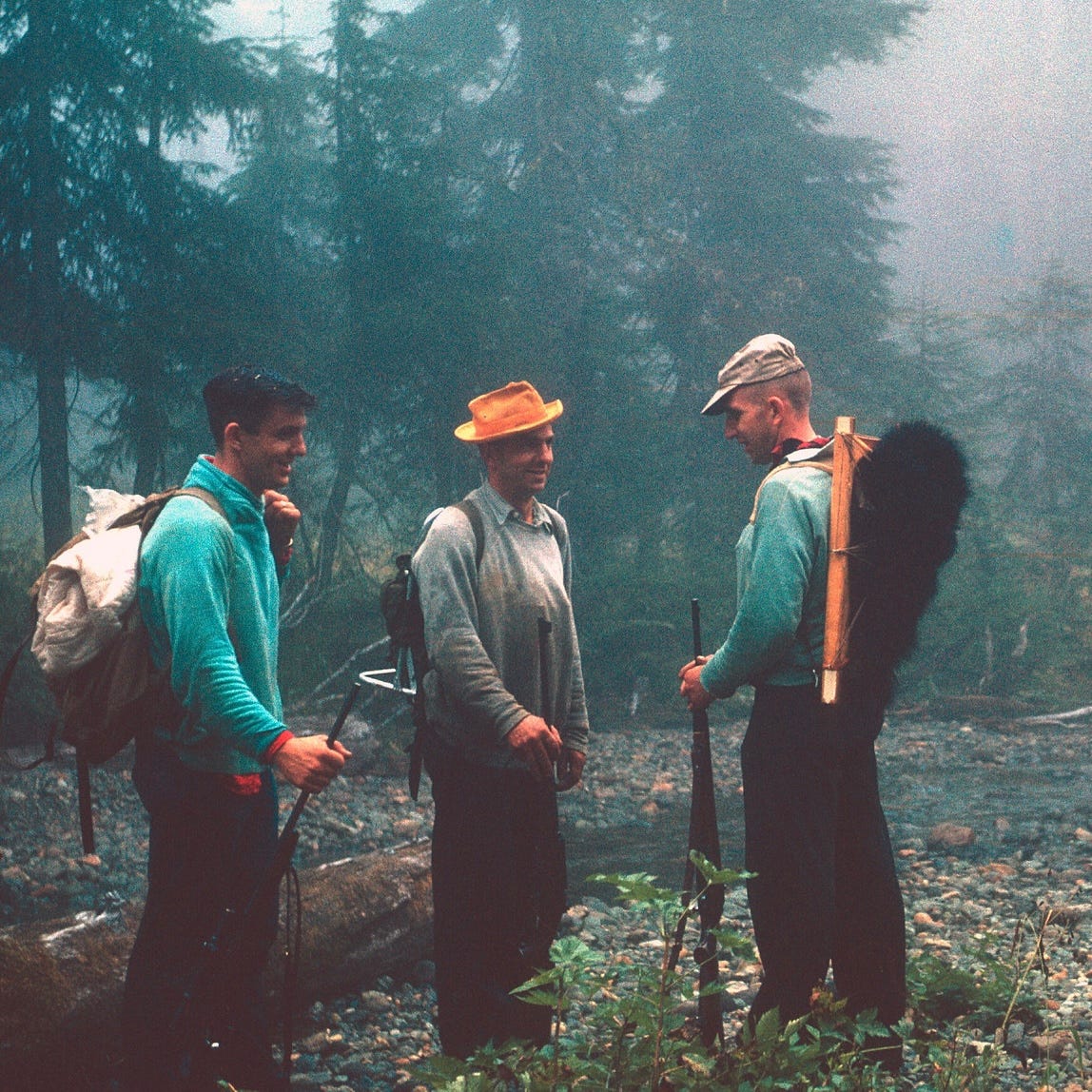
Richard said he was teaching his daughter to fish when she was about two years old. When he hooked a nice sized trout, she said, “Let me hold it, Daddy.” He cushioned it with paper and handed it to her. While she looked at it proudly, my brother Lisle said, “If you love it so much, why don’t you kiss it?”
“Next thing I knew, I was wiping trout slime off her lips.”
Peter decided to show his affidavits as a married-in storyteller. He told the story about the Widow Titus who used to be Miss Eugene. “As an elegant octogenarian, she always wore white gloves and drove a classy old car with no signal lights—she would simply signal with her white-gloved hands. One day a traffic officer stopped her for making an illegal left turn. She explained, and he apologized, saying he hadn’t seen the white-gloved hand signal. She snapped, ‘If it’d been my leg you’d’ve seen it!’”
You could tell Peter was telling a different kind of story, a suburban story about social class structures and gender roles. He was from New York, and it showed in the story he chose to tell.
Richard said he and my brother Lisle were left home alone in our house in Wenatchee one summer day with a set of darts. The house was filled with big house flies. Rich and Lisle considered it a hunting expedition, and one by one they spread every fly out into an inch-and-a-half red circle on the white walls. Mom wasn’t near as happy about it as they thought she was going to be and made them clean the walls with a bucket of soapy water and a brush.
Then he said, “Bob and me and Lisle and Warren and Jack Taylor (we never did like him much), and Sooner got into a lynx. We were in the Yakima basin; Sooner went on point to this strange-colored lynx. Jack shot it, I shot it, it fell and got up, disappearing down a steep hill into some brush and grass. Someone threw a rock in the bushes. The lynx leapt, the dog caught it in mid-air, and they went head over hill in a snarling bundle of fur. They went at it and the next thing we knew, the cat had the dog by the neck. Warren grabbed the dog by the back leg in the middle of the action and kind of stretched him out. I used my gunstock like a club and hit the cat, then the cat turned on me. I shot him in mid-air and the cat dropped dead. Sooner was quivering all over. When Warren kicked the cat and made it move, Sooner leapt back on the carcass. Turned out that was three-legged lynx. A back paw had been chewed out of a trap, healed and pulled up into the body. Jack Taylor wanted the cat stuffed. The taxidermist said that lynx was a hyperphase, and one in ten thousand come out that color.”
[NOTE: My brother Lisle adds a coda to the lynx incident at the end of this story in the Comments.]
Richard and I are alike in that we have the same hero—my father was his mentor. I think we carry Warren around inside our heads and hearts like a book we read, or who read us for half our lives. His character still walks with us. I know I, for one, still hear my dad’s voice, the cadence and humor of it. We carry his resonance as a kind of echo that still tells us how to be in the world.

When Rich wanted to demonstrate the character of my dad, his Uncle Warren, he told the story of a trip he was on with Warren and Rich’s dad, Bob, driving a truck with a camper. Rich and Lisle were both kids, riding and playing in the back. Warren and Bob got talking and changed the route they were taking. Once they had made up their minds about the new route, Warren stopped the truck, came around back and told the boys of the change in plan. Rich was dumbfounded. “Most guys, it’d never in the world occur to them to stop and tell kids—we were in the back, couldn’t see where we were going anyway. But he stopped and told us what was going on. I never got over that.”
Richard, like my dad and his dad and the other uncles, has an understated sense of heroism. He likes to tell stories where he looks slightly foolish, like sticking his foot in that birdcage at the dump. Other times, he tells stories that illustrate the foolishness of the greenhorn, like the people who ran their boat into a tree, or the flatlander who landed a salmon out of sheer dumb luck. He may laugh at them, he may leave them to stew in their own juices until he comes back from a full day of fishing, but he does the right thing and tows them in. In his comic telling of the world, the expert shot, the full creel are the details that in and of themselves speak of local heroism. And while he has access to tales of tragic stupidity and incomprehensible mayhem, these are not the ones that get told inside this family July 4 reunion circle. The stories he tells us, that we tell each other, remind us of our funny humanity, tell us over and over again of what is most important to us: that we are together, that we live in a wild and beautiful place with appropriate expertise, that we are family, and native to this place.





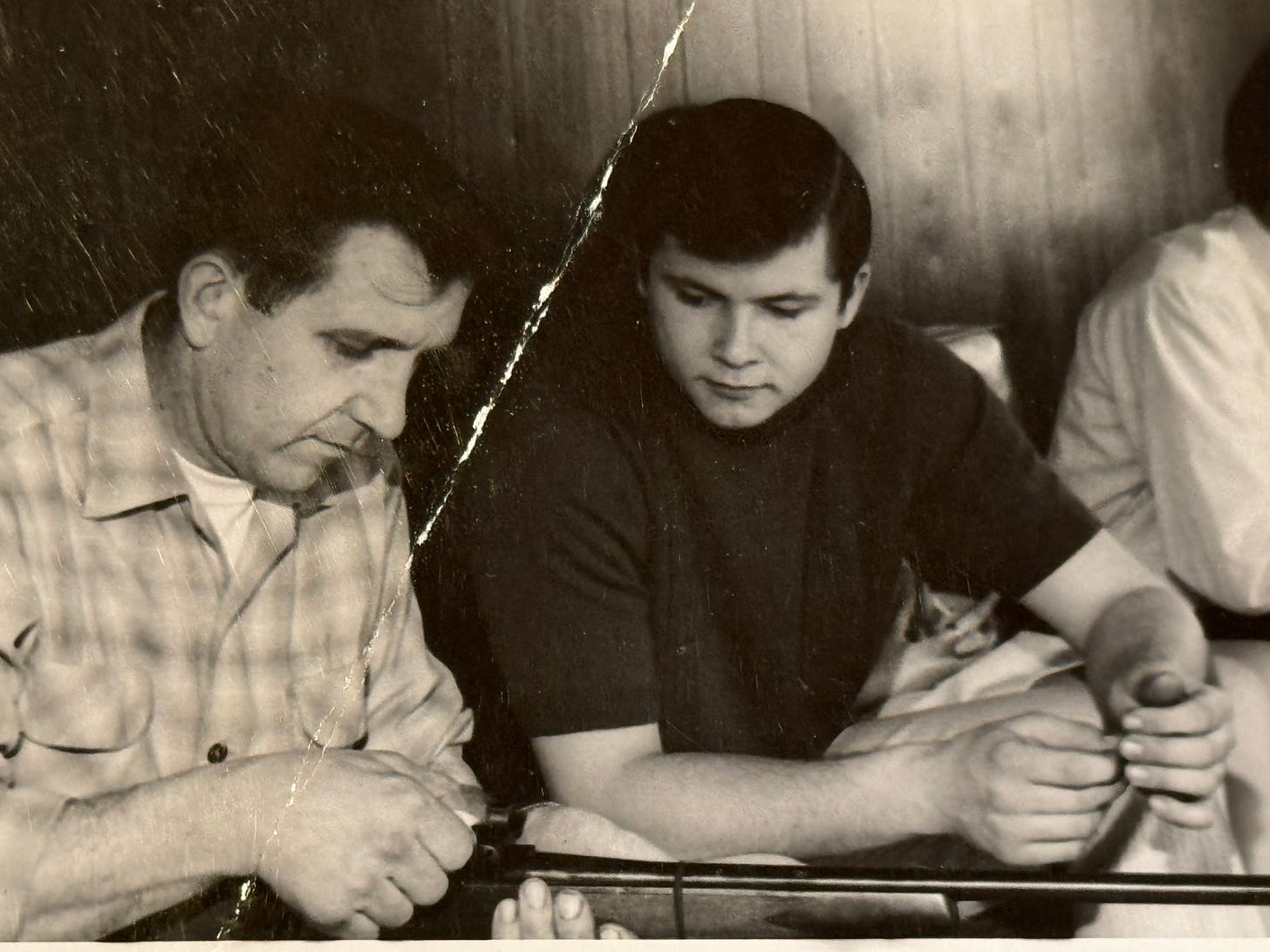
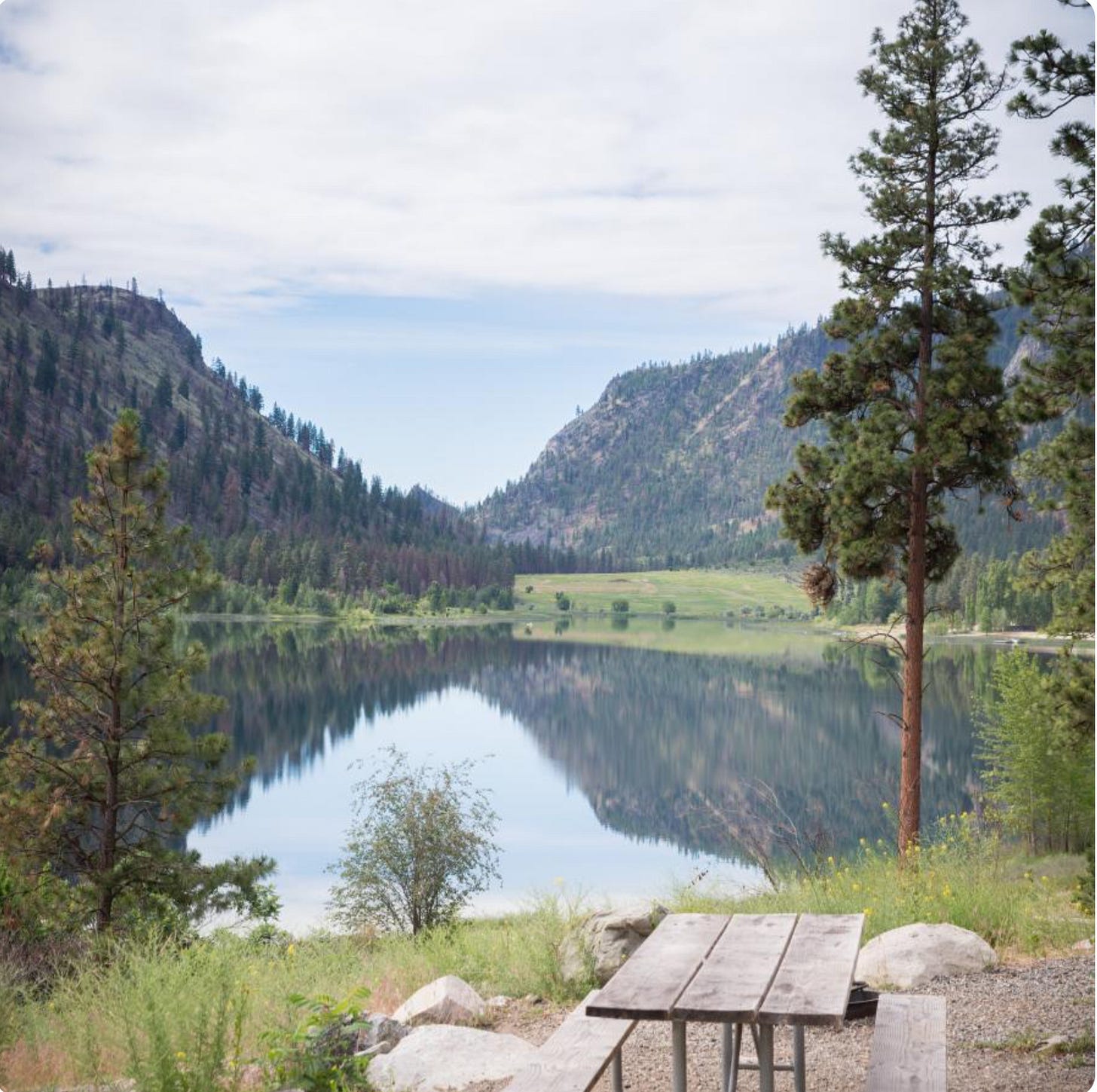
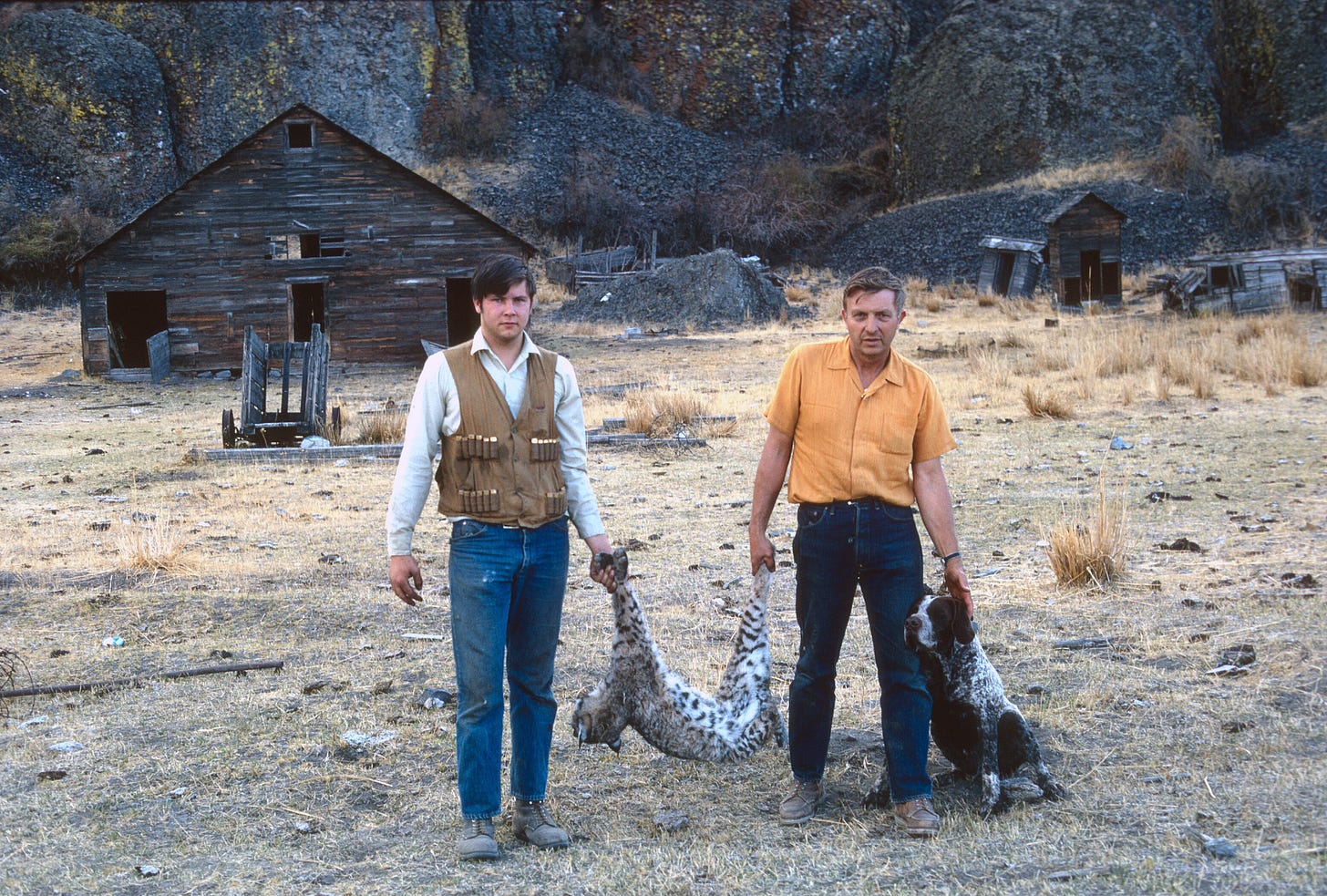
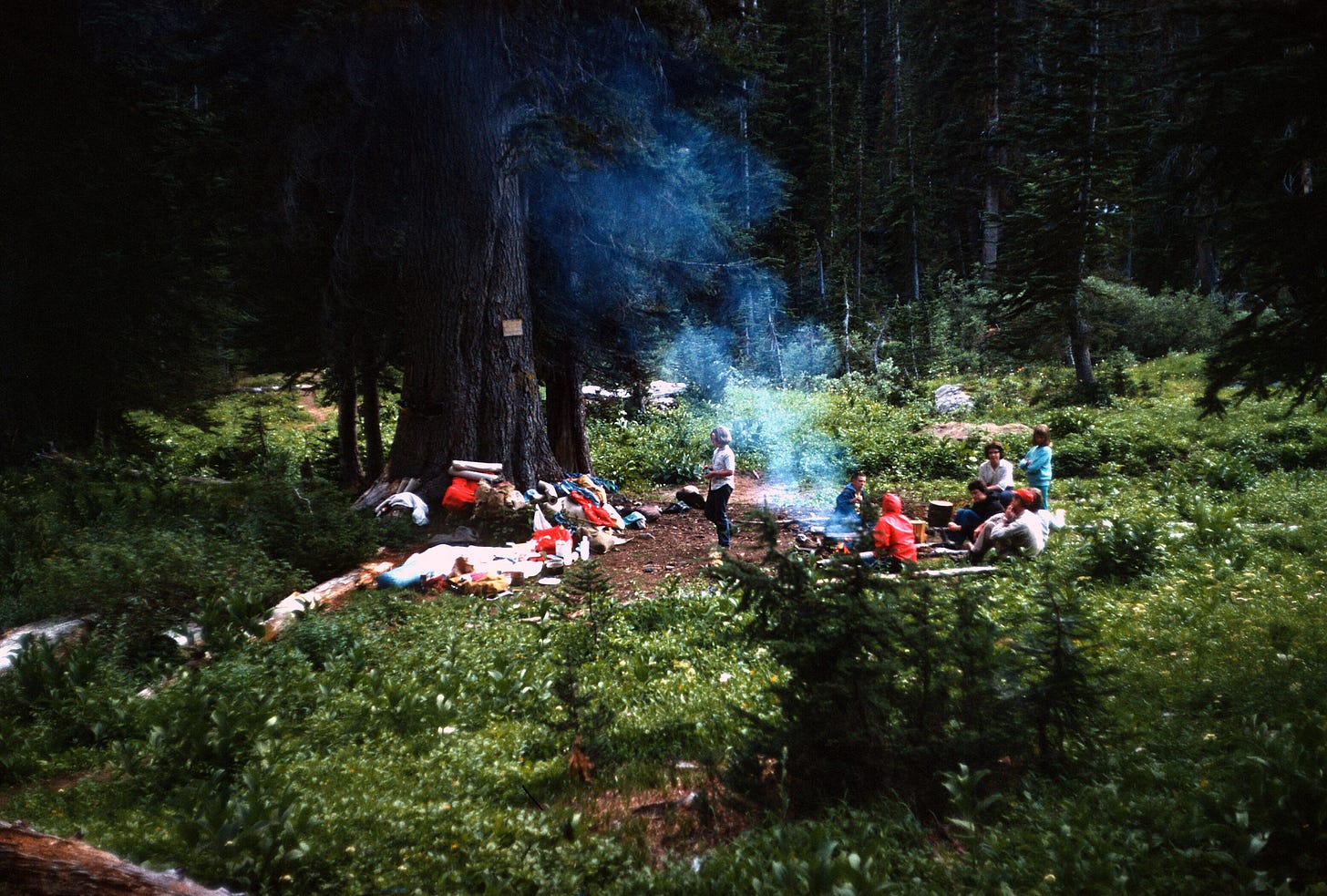
Thank you Sandy. The bobcat story is all wrong! I was there. It was on the Collivile Indian Rez. By Omak .Sooner pointed an unknown in a large clump of Sagebrush. We flushed it expecting a bird. Duane shot it in the ass with a shot gun. I was pissed, we don’t just shoot any damned thing that jumps out. Dad was always vocal about not shooting anything we weren’t eating. He also was pissed. The shot wounded the animal enough that Sooner soon caught up. They got in a fight and tumbled down a very steep lava cliff. Richard and someone, not Dad, he was with me, probably Jack Taylor, we didn’t like him very much, dispatched the poor animal. Not a proud moment. I return to that spot every year and can send you a photo of the slope.
Another great story from our incredible shared past! The bobcat story definitely morphed over the years but the general storyline is intact!